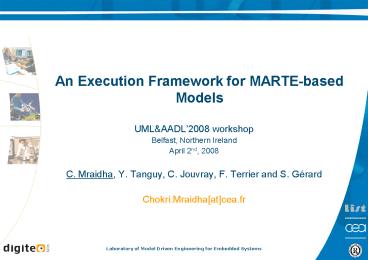An Execution Framework for MARTE-based Models - PowerPoint PPT Presentation
Title:
An Execution Framework for MARTE-based Models
Description:
Laboratory of Model Driven Engineering for Embedded Systems. An Execution Framework for MARTE ... Resources are managed either statically (pool) or dynamically ... – PowerPoint PPT presentation
Number of Views:48
Avg rating:3.0/5.0
Title: An Execution Framework for MARTE-based Models
1
An Execution Framework for MARTE-based Models
- UMLAADL2008 workshop
- Belfast, Northern Ireland
- April 2nd, 2008
- C. Mraidha, Y. Tanguy, C. Jouvray, F. Terrier and
S. Gérard - Chokri.Mraidhaatcea.fr
2
MDE for real-time applications
- Capturing real-time specificities in models
- UML
- Specialization for real-time domain MARTE
- Executing real-time models
- Well formed models
- Runtime support
- Proposal
- Modeling methodology based on UML/MARTE language
- Execution framework
3
Agenda
- UML profile for MARTE
- Accord approach
- Modeling methodology
- Execution framework
- MARTE models execution
- Conclusions
4
MARTE Overview
- Foundations for RT/E systems modeling and
analysis - ? CoreElements
- ? NFPs
- Time
- Generic resource modeling
- Generic component modeling
- Allocation
- Specialization of MARTE foundations for modeling
purpose (specification, design, ) - ? RTE model of computation and communication
- Software resource modeling
- Hardware resource modeling
Specialization of foundations for annotating
model for analysis purpose ? Generic
quantitative analysis ? Schedulability analysis
? Performance analysis
5
MARTE model of computation
- High-level modeling concepts for RT/E design
- Qualitative aspects
- E.g. concurrency and behavior
- Quantitative aspects as real-time feature
- E.g. deadline or period
- Allows expressing real-time constraints on
component interfaces and connectors - Applicable whether component are active or
passive - For active components, introduces specific models
of computation - Currently, active objects (e.g. Rhapsody, Rose
RT, Accord) - Alternative MoCC can be defined using the MARTE
foundations
6
MARTE model of computation (cont.)
- Provides high-level concepts for modeling
qualitative real-time features on classes /
structured classes / components - Real-Time Unit (RTUnit)
- Specialization of the Active Objects of the UML 2
- Owns at least one schedulable resource
- Resources are managed either statically (pool) or
dynamically - May have operational mode description (similar to
AADL modes) - Protected Passive Unit (PPUnit)
- Specialization of the Passive Objects of the UML2
- Requires schedulable resources to be executed
- Supports different concurrency policies (e.g.
sequential, guarded) - Policies are specified either locally or globally
- Execution is either immediateRemote or deferred
7
MARTE model of computation (cont.)
- Provides high-level concepts for modeling
quantitative real-time features on classes /
structured classes / components - Real-Time Behavior (RtBehavior)
- Message Queue size and policy bound to a provided
behavior - Real-Time Feature (RTF)
- Extends UML Action, Message, Signal,
BehavioralFeature - Relative/absolute/bound deadlines, ready time and
miss ratio - Real-Time Connector (RteConnector)
- Extends UML Connector
- Throughput, transmission mode and max
blocking/packet Tx time
8
Agenda
- UML profile for MARTE
- Accord approach
- Modeling methodology
- Execution framework
- MARTE models execution
- Conclusions
9
Accord framework architecture
- Accord is a platform of MDE for DRES
- Offers high level of abstraction approach
- Based on UML/MARTE
Powered with Papyrus http//www.papyrusuml.org
10
Outlines of the Accord modeling methodology
11
Accord model structure
- Consistency complementarities
- Separation of concerns
- Verify consistency between views
- Modeling system behavior
- Separation of concerns improves
- Readability
- Maintainability
- Reusability
? Use MARTE (RTEMoCC) to capture RTE
characteristics
12
Execution platform
- OS abstraction layer
- POSIX compliant operating systems
- Linux, Solaris, VxWorks
- Offers basic mechanisms (not dependent of the OS)
- Thread, semaphore, mutex
- Real-time kernel
- Relies on the OS abstraction layer
- Provides resources for MARTE RtUnits execution
- Real-Time Objects
- Provides a deadline controller that verifies RT
constraints at runtime - Real-Time Features
- Provides a scheduler
- Service scheduling
- Provides intra concurrency management policy of
RtUnits - n reader / 1 writer protocol
- ? Transformation from MARTE-based models to
execution platform specific models
13
Agenda
- UML profile for MARTE
- Accord approach
- Modeling methodology
- Execution Framework
- MARTE models execution
- Conclusions
14
Mapping MARTE concepts on the execution platform
MARTE RtBehavior
MARTE RtService
MARTE RTF
MARTE RtUnit
15
From MARTE-based model to RT executable code
Automatic transformations (Patterns applications)
C code generation
C code using Accord kernel facilities
16
Current limitations and next steps
- Current limitations
- Partial support of MARTE MoCC family
- C as the action language
- Component-based models are not executable
- Next steps and ongoing work
- Larger support of MARTE MoCC by Accord Kernel
(parameterization) - Code generator for an action language
- Provide transformations to the execution platform
for component-based models
17
Agenda
- UML profile for MARTE
- Accord approach
- Modeling methodology
- Execution Framework
- MARTE models execution
- Conclusions
18
Conclusions
- MARTE-based modeling methodology
- Provides executable MARTE-based models
- Execution platform
- Provides execution resources for MARTE concepts
- Tool support
- Modeling
- Papyrus UML (http//www.papyrus-uml.org)
- Advanced modeling for UML / MARTE / SysML
- Automated transformations
- MARTE-based models to execution platform mapping
(patterns) - Automatic C code generation
- Ongoing work for a larger support of MARTE MoCC
and modeling processes
19
Thank you for your attention!































